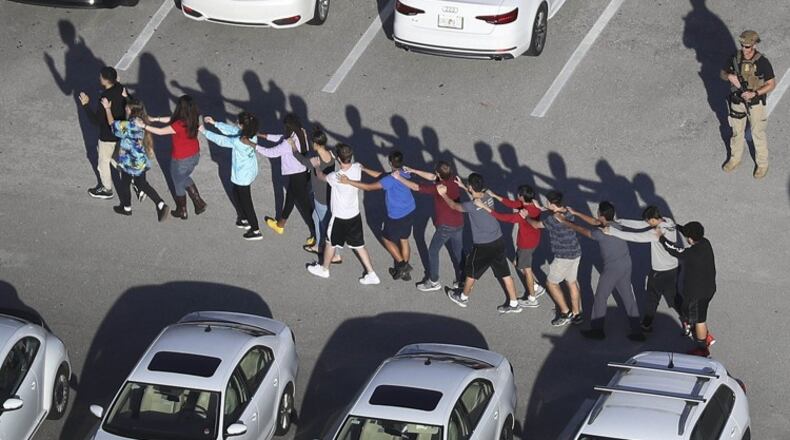It has been five days since the horrific shooting at Marjory Stoneman Douglas High School in Parkland, Fla., and so my self-imposed restriction on posting about it has now expired. Now, to those of you who demanded we talk about it on this blog, let’s talk.
Let’s start with why I waited five days to write about it. It’s of a piece with my other policy about these shootings, which is not to name the killer: My intent in both cases is to remove something counter-productive from the discussion. In the case of naming the killer, it’s whatever infamy he might get from even that little bit of publicity. In the case of waiting to comment, it’s the reflexive, retreat-to-your-corners mentality that almost always prevails in the early hours after such a terrible thing happens and no one actually knows much about how and why it happened. I’m not sure if I’ll stick with this new restriction -- you might call it a waiting period -- but I am convinced that, as with naming the killer, it would take some of the venom and vilification out of these “national discussions” if more people did the same.
In the immediate aftermath of a mass shooting, there is bound to be little fresh insight into the problem. Part of it is the lack of firm facts: To name just one example involving Parkland, we initially were told the killer belonged to a white supremacist group, and then later that he didn’t. But there is also an apparently overwhelming tendency to seek one of two outcomes from “the other side”: capitulation to your own way of thinking, or reaffirmation of their own wrongheadedness. Either way, the point seems to be to bask in one’s own self-appointed moral righteousness, rather than to move in any concrete, appreciable way toward a solution. How do I know? See the part about lack of firm facts: People simply launch into their previous positions on the issue before they have a clue whether the circumstances support that position.
You'd think that we would have learned by now, given that it's been demonstrated that the kind of legislation typically proposed after mass shootings most likely would not have prevented them. (That article is a little over two years old now, so it's possible an exception has emerged since then. But the basic point remains.) Fresh insight is necessary. But we don't want to wait around for that before accusing others of being child murderers or gun grabbers.
Wait a few days, and we not only learn vital information -- such as the fact the FBI was tipped off about the killer but failed to do anything about it, only the latest lapse in the systems we already have in place to precent these atrocities. That kind of information points to different problems to address than we might have thought. We also see some folks are willing to offer new ideas, or at least adopt new positions on older ideas, in light of these facts. One example is this piece for National Review by David French, arguing for temporary restraining orders on gun possession.
If you believe it will all be for naught, you’re not alone. But it’s worth thinking through why -- and if your answer is just “the NRA,” you’re not paying close enough attention to how this works.
As on so many other issues, both sides have carved out maximalist positions. One need not resort to nut-picking anonymous trolls on social media or comment threads to find anti-gun people who want to repeal the Second Amendment altogether ... which only reinforces the pro-gun crowd's belief that any further regulation or prohibition is the first step on a slippery slope ... which in turn makes the anti-gun crowd think there's no point in going for small measures ... which only reinforces the pro-gun crowd's belief ...
Pick another issue: immigration, education, entitlements, health care, taxes and spending; the list goes on. It’s pretty much the same with all of them.
In reality, the problem of mass shootings -- which has increased even as gun violence remains in decades-long decline -- will probably require a much more nuanced and multi-faceted response than anything that starts with "ban" or "repeal." If we are serious about these horrors being unacceptable, and as a parent I certainly think we should be, we ought to be serious about rethinking our positions in a way that addresses the specific trends we see.
Now, who wants to be serious?
About the Author
The Latest
Featured


